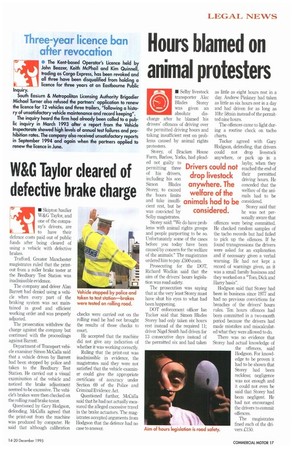Hours blamed on animal protesters
Page 19

If you've noticed an error in this article please click here to report it so we can fix it.
• Selby livestock transporter Alec Blades Storey was given an
absolute discharge after he blamed his drivers' offences of driving over the permitted driving hours and taking insufficient rest on problems caused by animal rights protesters.
Storey, of Bracken House Farm, Barlow, Yorks, had pleaded not guilty to permitting three of his drivers, including his son Simon Blades Storey, to exceed the hours limits and take insufficient rest, but he was convicted by Selby magistrates.
Storey said: "We do have problems with animal rights groups and people purporting to be so. Unfortunately some of the cases before you today have been caused by concern for the welfare of the animals." The magistrates ordered him to pay £500 costs.
Prosecuting for the DOT, Richard Wadkin said that the aim of the drivers' hours legislation was road safety.
The prosecution was saying that at the very least Storey must have shut his eyes to what had been happening.
DOT enforcement officer Ian Tucker said that Simon Blades Storey had only taken six hours rest instead of the required 11; driver Nigel Smith had driven for 13 consecutive days instead of the permitted six and had taken
as little as eight hours rest in a day. Andrew Pinkney had taken as little as six hours rest in a day and had driven for as long as 10hr 58min instead of the permitted nine hours.
The offences came to light during a routine check on tacho charts.
Tucker agreed with Gary Hodgson, defending, that drivers could not drop livestock anywhere, or park up in a layby, when they reached the end of their permitted driving hours. He conceded that the welfare of the animals had to be considered.
Storey said that he was not personally aware that offences were being committed. He checked random samples of the tacho records but had failed to pick up the offences If he found transgressions the drivers were asked for an explanation and if necessary given a verbal warning. He had not kept a record of warnings given, as it was a small family business and they worked on a "Tom, Dick and Harry basis".
Hodgson said that Storey had been in business since 1977 and had no previous convictions for breaches of the drivers' hours rules. Ten hours offences had been committed in a two-month period because the drivers had made mistakes and miscalculated what they were allowed to do.
There was no evidence that Storey had actual knowledge of the offences, said Hodgson. For knowledge to be proven it had to be shown that Storey had been reckless; negligence was not enough and it could not even be said that Storey had been negligent. He had not encouraged the drivers to commit offences.
The magistrates fined each of the drivers £150.












































































































